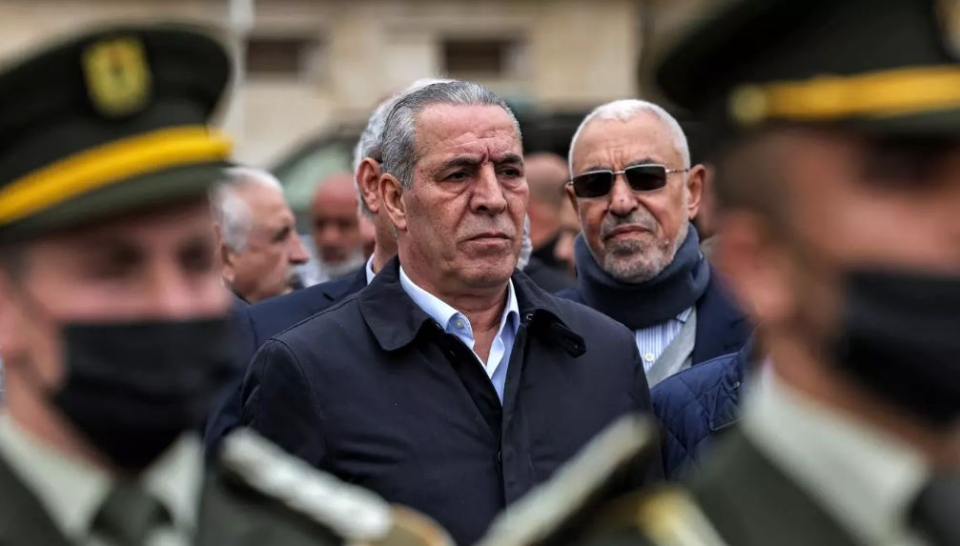A Palestinian Authority (PA) delegation is set to engage in discussions concerning Ramallah's potential role in a Saudi Arabia-Israel normalization agreement during an upcoming meeting with American and Saudi officials in Riyadh, as sources have informed Middle East Eye.
Scheduled to depart for Saudi Arabia on Monday, the delegation includes prominent figures such as Hussein al-Sheikh, President Mahmoud Abbas's deputy, Majed Farag, the head of the PA intelligence service (GIS), and Majdi Khaldi, senior diplomatic advisor to Abbas. Their agenda includes talks with Saudi Arabia's foreign minister, Faisal bin Farhan Al-Saud, and national security advisor, Musaed bin Mohammed Al-Aiban. Additionally, they will meet with Brett McGurk, the White House's coordinator for the Middle East and North Africa.
According to informed Palestinian sources, the PA officials plan to engage in discussions with Saudi Arabia, addressing concerns raised by the Saudi side regarding the potential normalization deal. However, they will not present specific demands during these talks.
For several months, the United States has taken the lead in facilitating negotiations between Saudi Arabia and Israel with the aim of establishing formal diplomatic ties. Saudi Arabia had initially extended the offer for normalization in 2002 under the Arab Peace Plan, which seeks the establishment of an independent Palestinian state in the West Bank and Gaza Strip, with East Jerusalem as its capital.
However, observers and sources familiar with the Biden administration's stance suggest that Riyadh may seek less extensive terms. In exchange for normalizing relations, Saudi Arabia is interested in receiving security assurances from the United States, assistance in developing a civilian nuclear program, and reduced constraints on U.S. arms sales.
While the Palestinian issue is not expected to be a central component of the agreement, there may be potential benefits for the Palestinians within the deal.
Historically, the PA has rejected similar U.S.-brokered normalization agreements between Israel and other Arab countries, including the United Arab Emirates, Bahrain, and Morocco. Nevertheless, some elements within the Palestinian Authority are reportedly reconsidering this stance, recognizing that normalization may proceed with or without their participation, and they could potentially derive political and financial advantages from it.
Regarding Palestinian demands, Israeli media recently reported a list presented by the PA to U.S. officials during a "tense" meeting in Amman, Jordan. These demands encompassed partial Palestinian control over sections of the so-called Area C in the occupied West Bank, a proposition unlikely to gain approval from Israel's nationalist government, which has advocated for the annexation of Area C. In the Oslo Accords, the West Bank was divided into three areas, with the PA holding limited control in areas A and B, while Israel retained full control in Area C, constituting 60 percent of Palestinian territory.
Additional Palestinian requests included U.S. support for UN recognition of Palestinian statehood, the reopening of the U.S. consulate in Jerusalem, and the resumption of "final status" negotiations between Palestinians and Israelis.
As the PA takes a pragmatic approach toward a potential Saudi-Israeli deal, reports suggest that Riyadh has offered to resume financial aid to Ramallah, which had been frozen since 2020. Saudi Arabia was a leading contributor to the PA between 1994 and 2020, providing nearly 10 percent of its total aid during that period, which amounted to over $200 million annually.
The PA has officially denied any linkage between the resumption of financial aid and the normalization agreement. However, a source within Fatah, the dominant faction within the PA, indicated that the PA is not likely to gain more than "financial assistance and some symbolic political gestures" from the prospective agreement. The source further stated that Saudi Arabia aims to ensure Palestinian acquiescence to the deal, with the PA ultimately agreeing to normalization.
The potential agreement may elicit public discontent in Saudi Arabia and among Arab populations, prompting Riyadh to seek "Palestinian cover" to justify its actions, as suggested by Ayman Talal Yousef, a professor of international relations at the Arab American University. In this context, the Palestinian issue is anticipated to remain of relatively low priority, with Saudi Arabia, the United States, and Israel emphasizing other geopolitical interests, as outlined by Yousef.

















